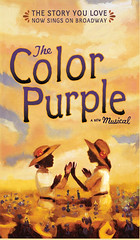 This week I've been working on The Color Purple - the musical based on Alice Walker's Pulitzer Prize winning novel.
This week I've been working on The Color Purple - the musical based on Alice Walker's Pulitzer Prize winning novel. The original and catchy music is incredible. The choreography and dancing is incredible. The performances transcend incredible.
The New York Times review doesn't exactly support or appreciate the genius of Marcia Norman's book and by book I mean the story. She managed to pluck out the skeleton of Alice Walker's rather detailed story and create the basis for a show which takes you through 40 years of Celie's life which is no cakewalk (as they might say in a Clifford Odets play). In place of her mother who is already dead by the time we meet Celie, her father makes her work like a slave and abuses her sexually. He also gets her pregnant twice and in both instances takes the babies away not letting her know their fates. He then marries her off to a man called Mister, even more cruel than himself, where she is to be Mister's personal sexual pin cushion and help raise his four wild children left to him by a cheating wife that was killed while with a boyfriend.
Yes. We learn all this in the first half hour of the play.
The NY Times reviewer seems to a mourn the loss of a slow pace and thinks the fictional characters are missing opportunities to relish their star moments. Why he would want a 2 and a half hour show to feel long and boring is beyond me. The review upset me.
The truth is this a wonderful musical done in the old fashioned style of musicals with great show-stopping numbers that help to balance out the sadness of the story. The show has classical elements. There is a Greek chorus in the form of three nosy-bodies from around the way, who sum up each scene as it happens making it easier to absorb the information that does come at you quickly.
There are wonderful solos and ballads, sexy duets, great group scenes, incredible dancing and a wonderful operatic tendency toward tragedy. There's one scene in particular, which made me think specifically of opera. It's a scene in the beginning of Act Two. Here's the set up.
Act Two begins with Celie reading Nettie's letters from Africa. We see the actress that plays Nettie reciting her letters against an amazing African dance as she describes her life as a missionary in an Olinka village. The scene is vibrant and exciting. The dancing is unbelievable. The dancers are called on to combine powerful ballet moves with African dancing with athletics and they do it flawlessly.
But if you're familiar with this story you know that Nettie's Olinka village is attacked by white soldiers. On stage, while this tragedy is being acted out, Harpo interupts Celie's letter reading with news of Sophia being attacked by the white mayor's men for saying "Hell no" to a 'job offer' as a maid from the mayor's wife and a parallel is drawn.
As the Olinka fall, so does Sophia. Harpo explains how in prison, Sophia has been beaten so badly, she's been blinded in one eye and can't hardly talk.
I'm getting all weepy just thinking about how to explain it to you. When you meet Sophia in Act One, she's boisterous and bursting with happiness. She's a ray of sunshine in Celie's dark world. To see this strong, positive and funny woman beaten down is naturally upsetting.
Most of Act Two moves me to tears. The dancing is so incredible and the writing so complete, that the people performing on stage can really perform to the best of their amazing abilities. This is good material and the people in this show should all be awarded for their performances.
I don't know what it is about this story. I'm not black. I don't live in the sharecropper south of the early 20th century and my life hasn't been even 1/16 as hard as the characters in this tale. But somehow, I connect with these characters.
Maybe it's because lying at the heart of this story is the empowerment of women. Celie has been beaten down by life to the point where her self-esteem has been completely eroded. Through all of it though, she has a glimmer of hope that is sparked by and eventually inflamed by the women that she meets and that teach her how to grow into a fully-realized women. She certainly didn't learn it from the cruel men that taught her that a woman's place is locked up and hidden.
The production also lets the men redeem themselves adding to the show's lesson that people can grow and change for the better. For example, Mister helps Celie's family get into the country for a moving climax to this incredible play.
When Celie's children return from Africa with Nettie in the end, I dare you not to cry. It's just as moving as it ought to be. It gets me every time. I've actually limited the amount of time I've been watching the show because I get so emotional, but I do go in and out to see certain scenes.
Let me end by saying that LaChanze earns that Tony each and every night. She's a remarkable performer, a true triple threat. You believe her as 14 year old girl just as easily as you believe she's 54 years old.
This show gets my highest recommendation. Go see it.
No comments:
Post a Comment